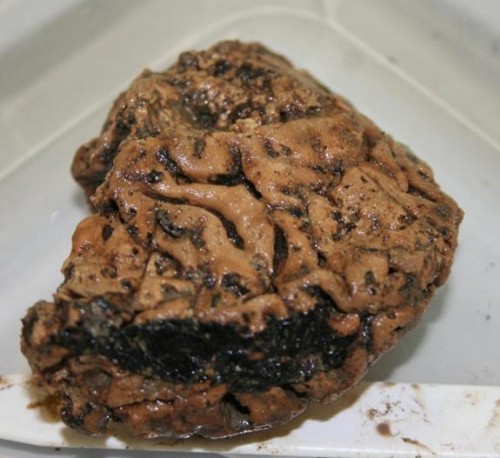2,500-Year Old Preserved Brain Discovered

Construction crews near York, UK, found the body of a man who died a violent death 2,500 years ago. Inside the skull was an almost completely intact brain, carefully preserved thanks to the soil in which the body was buried:
The Heslington remains, along with others O’Connor has discovered, appear to have been buried quickly after death in wet environments where the absence of oxygen prevented the brain tissue from putrefying. But while the oxygen-free environment seems key, it is not possible to rule out other factors like certain diseases or physiological changes, such as those that accompany starvation, that might predispose the brain to being preserved this way, according to O’Connor.
After being deposited in the water-logged pit, the Heslington brain began to change chemically, developing into a durable material and shrinking to a quarter of its size.
***
Also:800 Year Old Brain with Intact Cells

The paper describing this extraordinary artifact, which is due to be published in the journal NeuroImage next month, reads somewhat like a medieval murder mystery, with elements of archaeology, forensic science and neuropathology. The child’s skeletonised remains were exhumed in 1998 from a burial site in the city of Quimper, north-western France, in a wooden coffin with the head wrapped in leather and resting on a pillow. The coffin was dated by dendrochronology (tree-ring dating) to the mid- to late 13th century (1250-1275 AD), and the age of the child determined by examination of the teeth. After the remains were discovered, the brain was removed and immersed in a preservative formalin solution. Several years later, Christina Papageorgopolou of the University of Zurich’s Institute of Anatomy and her colleagues began to re-examine it

No comments:
Post a Comment